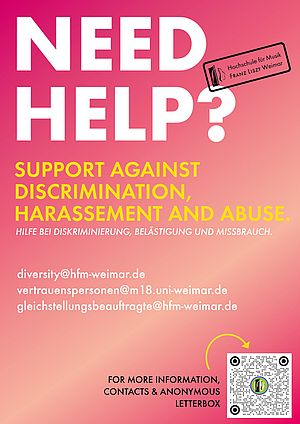Emergencies

Do you need help? Have you experienced something in your daily university life that has bothered you, hurt you, or caused you fear? Overwhelming situations can occur in higher education programs, and it’s important to find the right support. Abuse, harassment and discrimination can take many different forms - none of which are tolerated! Whatever you’ve experienced, you don’t have to go through it alone.
Here you will find a collection of contacts that offer professional advice, help, and information. Feel free to reach out anytime. You are not alone! We are here to help you. Do not hesitate to contact us with study-related or personal struggles.
The contact persons are not bound by any directives (Thuringia Higher Education Act §§6,7), but are committed to providing an open, fair, inclusive and safe university environment for all students and employees. Each of the listed contacts will treat your concerns confidentially and anonymously. The topics discussed, as well as your personal information, will remain strictly between you and the contact person.
Together, we can find the best way to support you in difficult times.
Student Council

The students are represented at the University of Music FRANZ LISZT Weimar by the Student Coucil (StuRa).
The Student Council (StuRa) consists of seven members who are elected by the students of the HfM for one year at the end of the summer semester. We meet once a week uring the lecture period. All meetings are open to the public and attendance is expressly encouraged. You can (but do not have to) register via stura(at)hfm-weimar.de
Current information from the StuRa can be found at https://www.instagram.com/sturahfm/ and in our regular newsletter (Klopapier).
You can find the latest minutes at https://moodledok.hfm-weimar.de/
The StuRa is divided into different departments, each headed by a member. Some of these departments are supported by working groups in which all students can get involved, among others the AG Awareness.
AG Awareness

The Awareness working group is an independent working group of students. It is formally affiliated with the university's student council (StuRa) and currently consists of six active members. It is committed to preventing and fighting all forms of discrimination in everyday life at the university and campaigns for respectful interaction, a constructive feedback culture and against the abuse of power. To achieve this, it is in contact with the university management and the committees for equality.
It also acts as an advisory centre for students by students. The group can be contacted by email: hfm.awareness(at)m18.uni-weimar.de, on Instagram: @hfm_ag.awareness and every Thursday from 4:30 to 5:30 p.m. in room 021 in the Fürstenhaus (only during lecture periods).
Student Counsellors in case of discrimination and (sexual) harassment

Lea Ray und Marius Machill
E-Mail: vertrauenspersonen(at)m18.uni-weimar.de
Alternative contact:
Digital anonymous mailbox
Psychosocial counselling
Students can also get psychosocial counselling from the Studierendenwerk Thüringen. The counselling service is free of charge and is also available in English.
Contact person for psychosocial counselling in Weimar:
Annett Kretschmer
Phone: +49 (0)3643 | 581 680
E-mail: psb-weimar(at)stw-thueringen.de
Anonymous mailbox
There are two anonymous mailboxes for contact:
What is discrimination?
Discrimination occurs when people are disadvantaged based on a protected characteristic. According to the law (German General Equal Treatment Act - AGG) and the related anti-discrimination directive of the university, protected characteristics include:
- → Ethnic origin or racial attributions
- → Gender
- → Religion or belief
- → Age
- → Sexual identity
- → Chronic illness or disability
There are also efforts by associations and policymakers to expand the listed categories. For example: to include
- → regional origin
- → parenthood/care responsibility
- → social status
- → physical characteristics
What is harassment?
Harassment, as defined in § 3 (3) of the AGG, refers to unwanted behavior that intends to or results in violating the dignity of the person concerned, and creating a hostile environment. This includes both verbal and non-verbal behaviors. An environment is considered hostile when the incidents exceed a certain threshold of severity, to the point that the affected person’s wellbeing is impaired. An example of harassment could be an employee repeatedly making homophobic jokes towards a colleague, causing humiliation and hostility in the work environment.
Sexual harassment (§ 3 (4) AGG) occurs when harassment is based on sexual motives. Unlike harassment under § 3 (3) AGG, a single act is sufficient for sexual harassment (a hostile environment is not required), as the intrusion into the personal sphere is particularly serious.
What is bullying?
Bullying refers to behavior that violates the dignity of the person concerned, especially when it creates an environment characterized by intimidation, hostility, humiliation, degradation, or insults.
Bullying is typically characterized by recurring incidents. Unlike discrimination, bullying is not necessarily linked to an attribution of characteristics.
Who can I turn to with my concerns?
You can get in touch with one of the contact points listed above. Other possible support systems through the university include:
- → the Diversity, Equal Opportunities, or Foreign Affairs officers
- → the representative for people with disabilities
- → the Staff Council
If you wish to reach out to other students, contact details of student representatives are also provided. Additionally, you can seek psychosocial counseling through the Student Services Thuringia.
All contact details are listed above.
When should I seek help?
You do not have to face the situation alone. Talk to a trusted person and/or one of the contact points listed here.
Complaints can be made for both disadvantages and (sexual) harassment originating from professors, lecturers, employees, as well as actions between employees and students.
Can I remain anonymous?
For anonymous contact, you can use two "anonymous mailboxes", which you find here:
Digital Anonymous Mailbox of the Diversity Officer
Digital Anonymous Mailbox of the Student Counsellors
If you approach these specific contact persons, your data will be treated confidentially and will not be disclosed.
Can I prepare for a contact?
Here's how you can prepare for a consultation:
- → Document all relevant information to get a clear overview of your complaint.
- → If possible, formulate your complaint in writing to ensure that you capture all the important points.
These preparatory steps will help the contact person provide helpful and productive advice.











